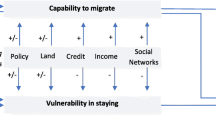Abstract
The attitude of future generations towards environmental assets may well be different from ours, and it is necessary to take into account thispossibility explicitly in the current debate about environmental policy. The question we are addressing here is: should uncertainty about futurepreferences lead to a more conservative attitude towards environment?Previous literature shows that it is the case when society expects that onaverage future preferences will be more in favor of environment than ours,but this result relies heavily on the assumption of a separability betweenconsumption and environmental quality in the utility function. We show thatthings are less simple when preferences are non-separable: the attitude ofthe society now depends not only on the expectation of the change inpreferences but also on the characteristics of the economy (impatience,intertemporal flexibility, natural capacities of regeneration of theenvironment, relative preference for the environment), on its history(initial level of the environmental quality) and on the date at whichpreferences are expected to change (near or far future).
Similar content being viewed by others
References
Ayong Le Kama, A. (2001), ‘Preservation and Uncertain Future Preferences’, Economic Theory 8(3), 745–752.
Beltratti, A. (1996), Models of Economic Growth with Environmental Assets. Fondazione ENI Enrico Mattei series on Economics, Energy and Environment, Dordrecht, The Netherlands: Kluwer Academic Publishers.
Beltratti, A. G., G. Chichilnisky and G. M. Heal (1993), Preservation, Uncertain Future Preferences and Irreversibility. Nota di Lavoro 59.93, Fondazione ENI Enrico Mattei, Milan, Italy.
Beltratti, A. G., G. Chichilnisky and G. M. Heal (1998), ‘Uncertain Future Preferences and Conservation’, in G. Chichilnisky and G. M. Heal, eds., Sustainability: Dynamics and Uncertainty.
Fondazione ENI Enrico Mattei series on Economics, Energy and Environment, Dordrecht, The Netherlands: Kluwer Academic Publishers.
Brasão, A. and M. Cunha-e-Sâ (1998), Optimal Growth, Uncertain Future Preferences and Preservation.
Universidade Nova de Lisboa, Faculdade de Economia. Paper presented at the First World Congress, EARE/EAERE, Venice, June 25-27.
Dasgupta, P. S. and G. M. Heal (1974), ‘The Optimal Depletion of Exhaustible Resources’, Review of Economic Studies, Symposium Issue, 3-28.
Heal G. and B. Kriström (2002), ‘Uncertainty and Climate Change’, Environmental and Resource Economics 22(1-2), 3–39.
Michel, P. and G. Rotillon (1996), ‘Desutility of Pollution and Endogenous Growth’, Environmental and Resource Economics 6, 279–300.
Smulders, S. and R. Gradus (1996), ‘Pollution Abatement and Long-term Growth’, European Journal of Political Economy 12, 505–532.
Author information
Authors and Affiliations
Corresponding author
Rights and permissions
About this article
Cite this article
Le Kama, A.A., Schubert, K. Growth, Environment and Uncertain Future Preferences. Environmental and Resource Economics 28, 31–53 (2004). https://doi.org/10.1023/B:EARE.0000023820.15522.a4
Issue Date:
DOI: https://doi.org/10.1023/B:EARE.0000023820.15522.a4




